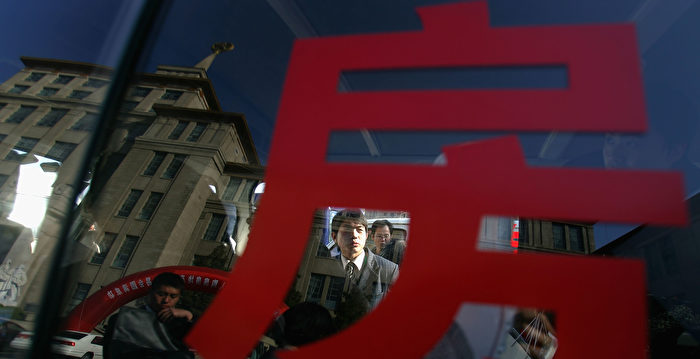[Epoch Times November 10, 2021](Epoch Times reporter Lin Yan comprehensive report) As the wave of debt defaults by Chinese real estate companies continues to expand, the Chinese Communist Party has held intensive seminars for two consecutive days since this week.
China’s domestic media CBN reported on Tuesday (November 9) that the China Interbank Market Dealers Association held a symposium with representatives of real estate companies on Tuesday, and some real estate companies planned to issue bonds in the interbank market in the near future.
The report quoted participants as revealing that real estate companies such as China Merchants Shekou, Poly Development, Country Garden, Longfor Group, Jiayuan Chuangsheng, and Midea Real Estate have plans to register and issue debt financing instruments in the interbank market in the near future.
A source close to supervision said, “I understand that (officials) still have to release some positive signals.”
Kaisa called on state-owned enterprises to help private enterprises supplement cash flow at the conference
Reuters on Monday quoted a person with direct knowledge of the meeting as saying that the State Council Development Research Center, a think tank of the State Council of the Communist Party of China, held a meeting with a number of real estate companies and banks in Shenzhen on Monday (8th). Participants at the meeting included Vanke, Kaisa and some financial institutions.
According to sources, Kaisa called for state-owned enterprises to acquire real estate projects or introduce them as strategic investors to help private enterprises supplement cash flow.
Kaisa is one of the largest borrowers in the international bond market in China’s real estate industry, and it failed to redeem an expired wealth management product last week.
Kaisa said at the meeting that the company’s cash flow is very tight. Due to the continuous downgrades given by credit rating agencies, and banks further stop lending due to the downgrading of ratings, companies are encountering huge difficulties. In addition, it also revealed that domestic financial companies have already transferred company funds in violation of regulations.
On the other hand, due to soaring borrowing costs, fewer Chinese people are buying apartments, and real estate valuations have fallen, making it increasingly difficult for developers to find money.
Evergrande and other breaches of contract continue to be news, but Beijing says it’s okay
Since China’s Evergrande debt crisis broke out in September, the crisis has spread to more private real estate companies. All these have exposed the shortcomings of China’s financial system-unlimited borrowing, expansion and corruption.
So far, at least four real estate developers have defaulted on their dollar bonds. According to one estimate, in the next two months alone, Chinese real estate companies will have US$40 billion in payments to foreign investors.
However, the CCP authorities still verbally signaled that they had not seen any problems.
The New York Times reported on Tuesday that the Chinese Communist Party leader Xi Jinping is reshaping China’s business world according to his wishes. Most importantly, it means control. In the past, administrative officials gave the green light to achieve economic growth at all costs, but now, officials want to control which industries are booming, which industries go bankrupt, and how they happen.
If the Chinese Communist Party rescues Evergrande, it will inevitably send a message that some companies are too big to fail; if they do not do it, there will be as many as 1.6 million home buyers waiting for unfinished apartments and hundreds of small businesses, creditors and banks. Will lose their hard-earned investment.
Real estate drags down the annual growth rate of economic growth or drops to 3-5%
Bankers and financial professionals believe that if the Chinese (CCP) government insists not to provide assistance to the real estate industry, more than US$300 billion in outstanding real estate debt will have an impact on the Chinese economy.
Yao Wei, an economist at Societe Generale in Hong Kong, reminded that if China’s real estate industry ceases to be a growth driver, there will be no other sector or industry to fill this gap.
“New Times” reported that the long-term prospects of the Chinese economy are uncertain. Some analysts say that Xi Jinping’s actions and actions to curb high debt have already produced great changes in China’s economy. The world’s second largest economy is slowing down, and the Chinese Communist government has to do more to reignite economic vitality.
Real estate activities account for about a quarter of China’s gross domestic product (GDP). Over the years, real estate speculation has provided support for local employment and government revenue. The Wall Street Journal reported that economists say that without a prosperous real estate market, China’s annual economic growth rate in the next few years may be around 3%-5%, instead of the usual 6% or more.
In the face of a series of debt defaults by Chinese real estate companies, the Chinese authorities have also begun to appease investors, claiming that Evergrande’s risks are controllable, and promising to relax China’s capital controls on the inflow and out of funds, which will help Evergrande and other real estate developers Payment by foreign creditors.
Matthew Chow, a Chinese real estate analyst and director of S&P Global Ratings, told New Times: “The basic situation of Evergrande has not really changed, and we are still convinced that default is almost certain.”
Editor in charge: Ye Ziwei#
.
